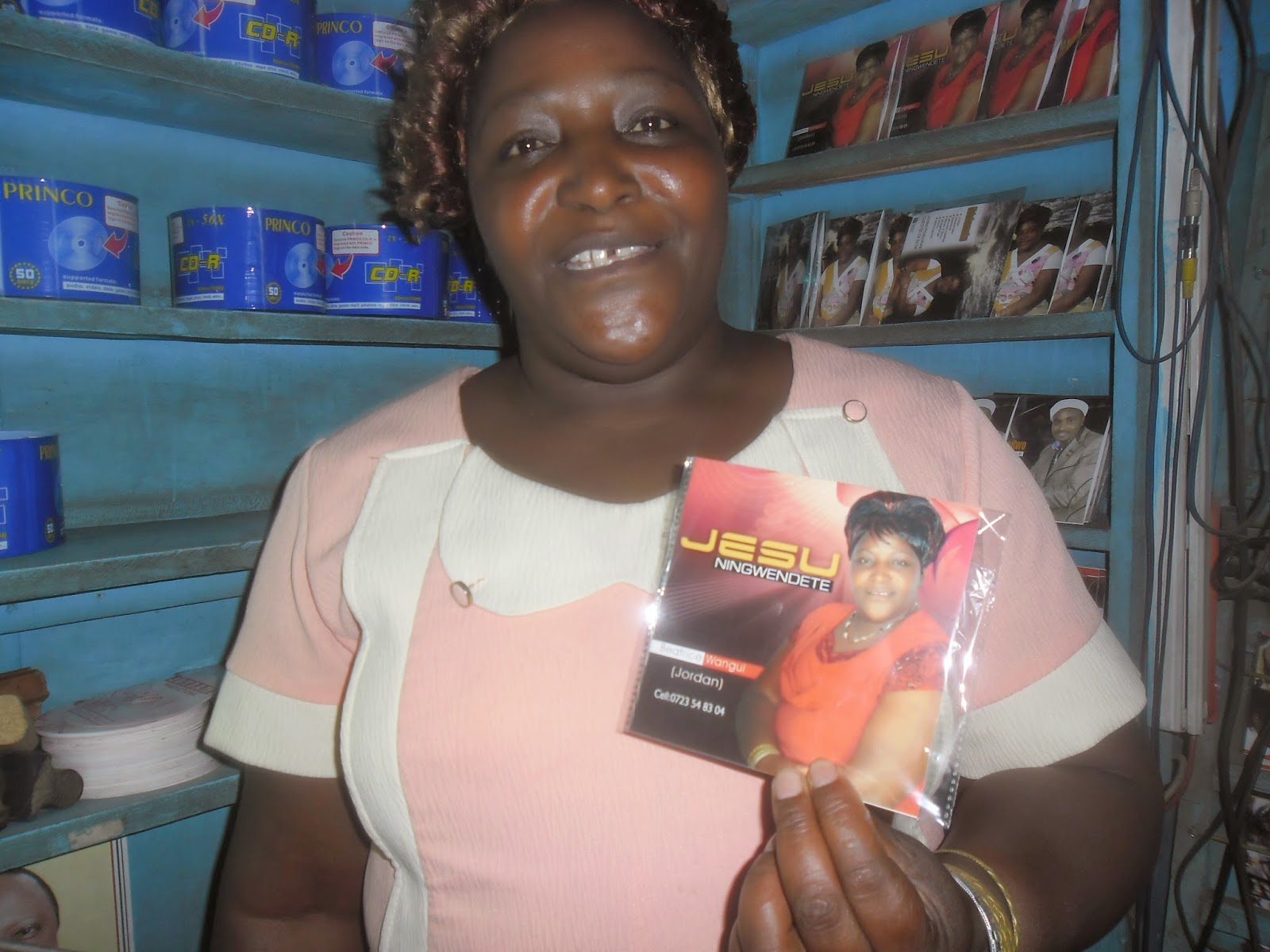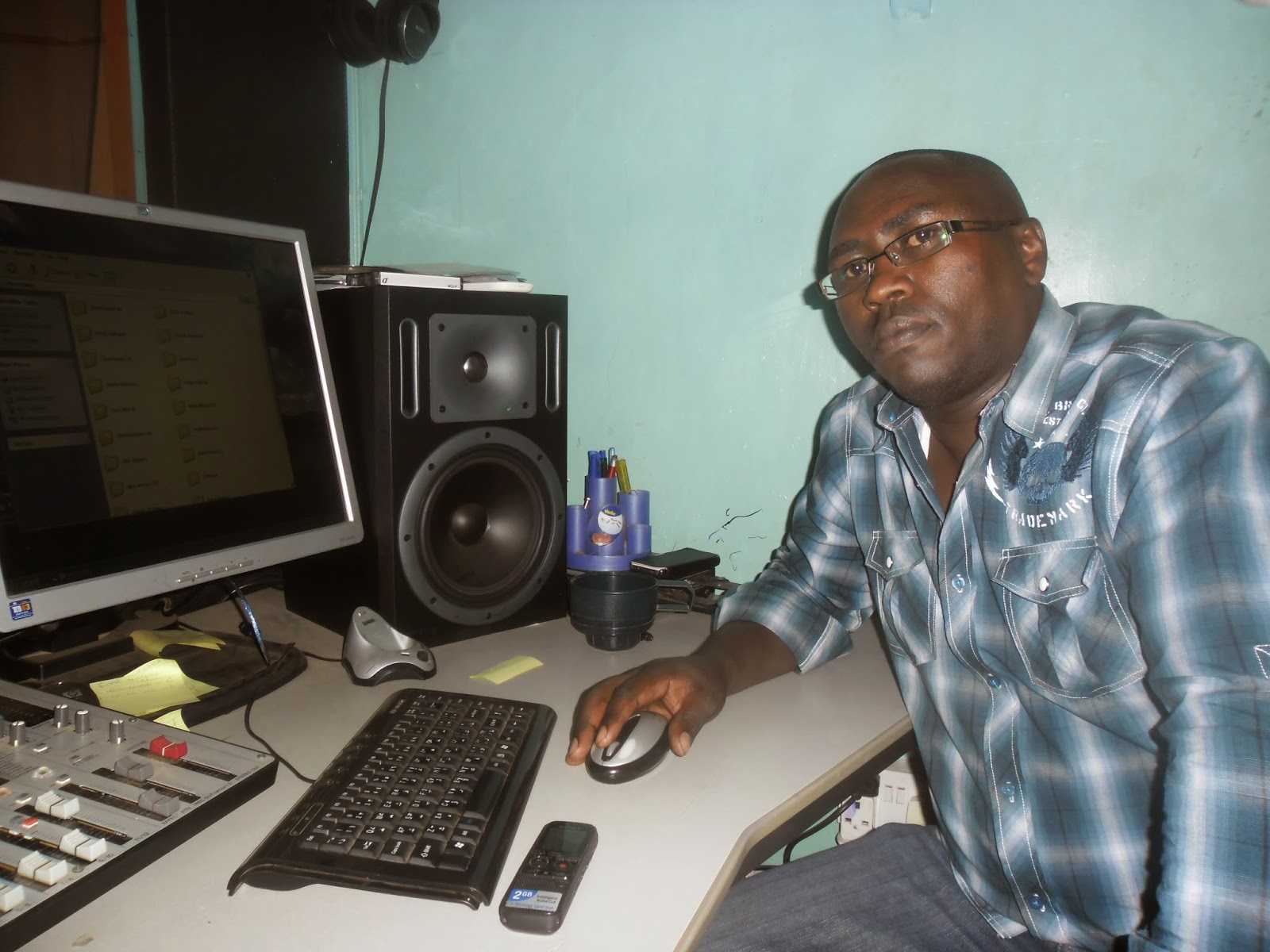Early Life
In Kikuyu Music, Beatrice Wangui is
nicknamed Jordan after the title of her 2002 debut hit album. Born
in Kanyenyaini, Muranga County, the young Wangui had a natural talent
in music as she grew up, in late 70s and early 80s. Then, she was
the lead singer at youth camps organized by churches and at primary
school festivals. What was evident at that young age was, Wangui had
a natural talent to compose original songs that were sung at
weddings, church events or music festivals.
I’d just sit down and God would give
me ideas on what to compose,” Wangui told Kikuyu Musicians. Later
on she taught her peers to sing the songs she composed. She also
credits her music teacher Mr. Gitau who gave her vocal training. A
song like Jordan, which later got recorded in her debut album Wangui
recalls she wrote it when young. “I never thought those songs could
be produced,” Wangui said.
Meeting Nebster Muhiko
After class 8 due to lack of fees and
family problems Wangui’s formal education halted. With no further
formal educational prospects, she joined her mother in picking tea as
a casual laborer until 2000. She left home for her brother’s place
in Nairobi. By then, songs that later were in the Jordan album, were
being sung in Churches in Muranga before they were recorded. While
at her brother’s place, she bumped on Nebster Muhiko a renowned
gospel musician who was hawking his cassettes.
Wangui longed to have her music
produced and she be selling it. She approached Muhiko for advice on
having her music produced. Less than a week later, Muhiko auditioned
her to see if she could sing and was so impressed they did a duet on
one of his songs “My Husband” after 3 days of rehearsal. Muhiko
approached Joestar Productions and asked them to produce Wangui’s
songs. Her mother gave her 20,000 to pay for the recording but the
quality didn’t impress her.
Debut Album Jordan
She re-recorded the whole Jordan album
in 2002 and the VCD was released in 2005. The title song inspiration
came from a preaching Wangui heard at a young age, on the story of
Naman the leper king dipping himself on the Jordan River 7 times to
be healed. The Jordan album was an instant debut hit and to date she
has sold over 100,000 copies. That instant success from a first
album made her realize it’s GOD who anoints one with favor and it’s
not much about hard work.
“I know musicians who sing 5 albums and
are it’s their 6th that is recognized just wait on GOD,”
noted Wangui. Her follow up album to the debut was a
Kigooco (praise) album that added modernity to traditional Kikuyu
spiritual gospel songs. Her third album Nikii Giki Wonire (what did you see) also hit. The title song, driven by a Keyboard riff
from Njoroge Wa Keyboard sold and gave her lots of money. The title
song, came about after she realized a friend she got saved with at a
young age, and with whom they prayed together had backslid and gone
to drinking and promiscuity.
“It broke my heart to see her in that
state, and in a way the song is directed to all backsliders though
that lady life inspired the composition,” said Wangui. She
recalls, her and the lady making promises to God when they were young
at youth camps that if GOD blessed them, they would tithe and take
care of the widows and orphans. The album garnered her money in
millions of shillings and she bought her first car, a plot and built
her home with 5 bedrooms. Until today, the album still sells at her
music shop at Simba Centre River Road Nairobi.
Composition through Experiences
To Wangui composing comes naturally,
she gets the message or theme of the song first and the melody comes
later automatically. “It’s a gift from GOD,” she adds. Most of
her songs like ‘Niunumbuyagia Mwathani’ are on encouragement and
draw inspiration from things she witnesses. In Jordan album, she
sang a song ‘Ona Warumwo’ (even if taunted), after she visited a
home where a mother in law publicly mocked her son’s wife, because
she wanted him to marry another lady from a rich family unlike the
one from a poor family she married. The song was directed to the lady
to trust GOD amidst her tribulations.
Wangui’s own experiences have also
served to inspire compositions. In her album Giki No Kiambiriria
(This is a start) the title song and Tiga Niwe Mwathani (Were it not for You Lord) song are her story. After she began to be blessed she
some friends start to gossip and get jealous of her. “Some friends
I’d helped hated me not because I wronged them,” Wangui said.
That inspired Wangui to compose Giki no KIambiriria, to illustrate
this is just a beginning of God’s blessings with many more to come,
and she won’t look back or stop praising because of jealousy.
Tiga Niwe song in Giki no Kiambiriria album also came through an experience. After she moved out of her
brother’s home, she got reluctantly housed by her mom’s friend.
But on the third week she was chased out subtly. Wangui recalls she
used to sleep on the couch in the living room. One day the lady home
owner woke her up at 5am, and told her there would be visitors who
would sleepover. Wangui asked if she could come back in the evening,
the lady home owner told her no, because the visitors would be there
for days. That day, she went back to the village and joined her
mother in picking tea there as she hawked some of her cassettes.
Sleeping on Cartons on the Floor and
Power of Prayer
With the money she accumulated, Wangui
came back to Nairobi, and rented a one room house in Huruma estate.
On that house for 4 weeks, she slept on hard cartons spread on the
floor and covered herself with a leso. She had borrowed the cartons
from an Asian trader until she got money for a mattress. During the
day she hawked cassettes. Still, she admits she loved life and was
happy and content she had her own house and independence. Since
earlier days a friend in earlier days had chased her out of a house
they shared.
“Those who know me and my home today,
don’t believe when I tell them I slept on cartons on the floor, GOD
has blessed me,” said Wangui. That inspired her to compose Tiga
Niwe song. Wangui says people should not despise themselves due to
lack of education or coming from poor backgrounds. “I know GOD can
mould Your life, educated or not if You have faith in HIM, this is
me,” she adds. She also attributes her success to a prayer
lifestyle as there are instances man may not be of help due to
jealousy or biases. “Tell GOD what You desire,” she said.
Advice to Budding Musicians
To avoid frustrations of finding the
right studio, Wangui advices budding musicians like from the village
to connect with musicians whose music they like. With her she
connected with Muhiko but with time got to know better quality
recording studios. “I knew I could sing and my motive was for
people to get God’s message through my songs,” said Wangui.
Money according to Wangui, shouldn’t be motivate a gospel musician
as ministering is what matters most. “Be patient and You will be
rewarded by GOD even amidst piracy since GOD’s land never lacks
harvests,” said Wangui.
She also urges one to go to gospel
music only if it’s a calling from God not with aim of getting money
like other established musicians. “Many have come with different
motives and ended up disappointed,” said Wangui. Having been
established as a gospel musician, she mentors and does backup vocals
for other upcoming ones like Jane Mumenya, Milkah Irungu and Maggy
Francis. She also sells their new music at her shop at Simba Centre
which she has operated since 2004. And distributes the music through
her car to reach more people and curtail the influence of pirates.
Her Future Aims
Her aim in coming years, it to start a
music production studio to record other new musicians, currently she
records at Dede records. However Wangui prefers to record at various
studios to get different sounds. Niki Giki Wonire was recorded by
John Chege of Strongpoint Media. To grow artistically in her music
craft, she listens to other more established musicians to learn. She
has also collaborated with Muigai Wa Njoroge and Muhiko in an album
title Crisis 1 and 2 highlighting issues of IDPs in Kenya.
Elevation to Elite Platforms
Through music Wangui has gotten to
perform for current Kenya’s President Uhuru. Every Friday to Sunday
she sings at events like overnight prayer meetings, weddings and
Sunday church services. Lately every Friday with Ngaruiya Junior,
Njoroge wa Keyboard, Triza Wangui and Makumbi Pilot they do a praise
show at Kameme FM hosted by Kamau wa Kamlesh. To Wangui, she
considers that it’s GOD who chose them to be in that platform,
since they were chosen from a big pool.
Besides music, she acts as ‘Wagacuma’
and produces Christian themed plays with the likes of veteran River
Road actor, Wandahuhu, Githendu and Nyakirata. Even when young she
used to act in school plays. Those plays centre on God giving
victory in every situation one goes through. Wangui runs a group
caring for orphans and widows and urges fans to join her in that
ministry. “Its what I promises GOD I’d do if HE uplifted me,
besides tithing and HE has,” she said.
Besides GOD, Wangui appreciates her
fans even in Diaspora buying her music and are blessed by it. She
urges those outside Kenya, to invite her to minister in crusades or
churches, and prays that GOD gives them their hearts desires. She is
also a mother to a son who is a hardware trader in Ruiru town, and a
daughter who works closely with her in gospel music ministry. Wangui
is highly appreciative of her mom who always encouraged her and gave
her money to record her first album. “I love her so much she is my
second god,” she said smiling. Contact Wangui at
nikiiwonire@gmail.com
kikuyumusicians@gmail.com
11:15 AM | 0
comments | Read More




















